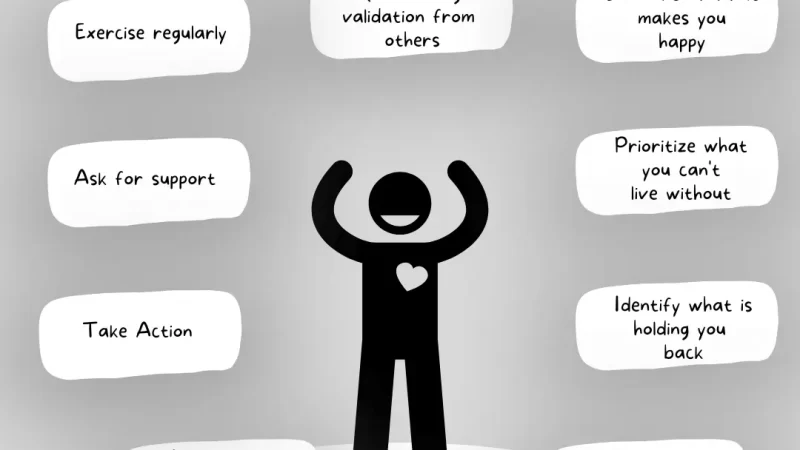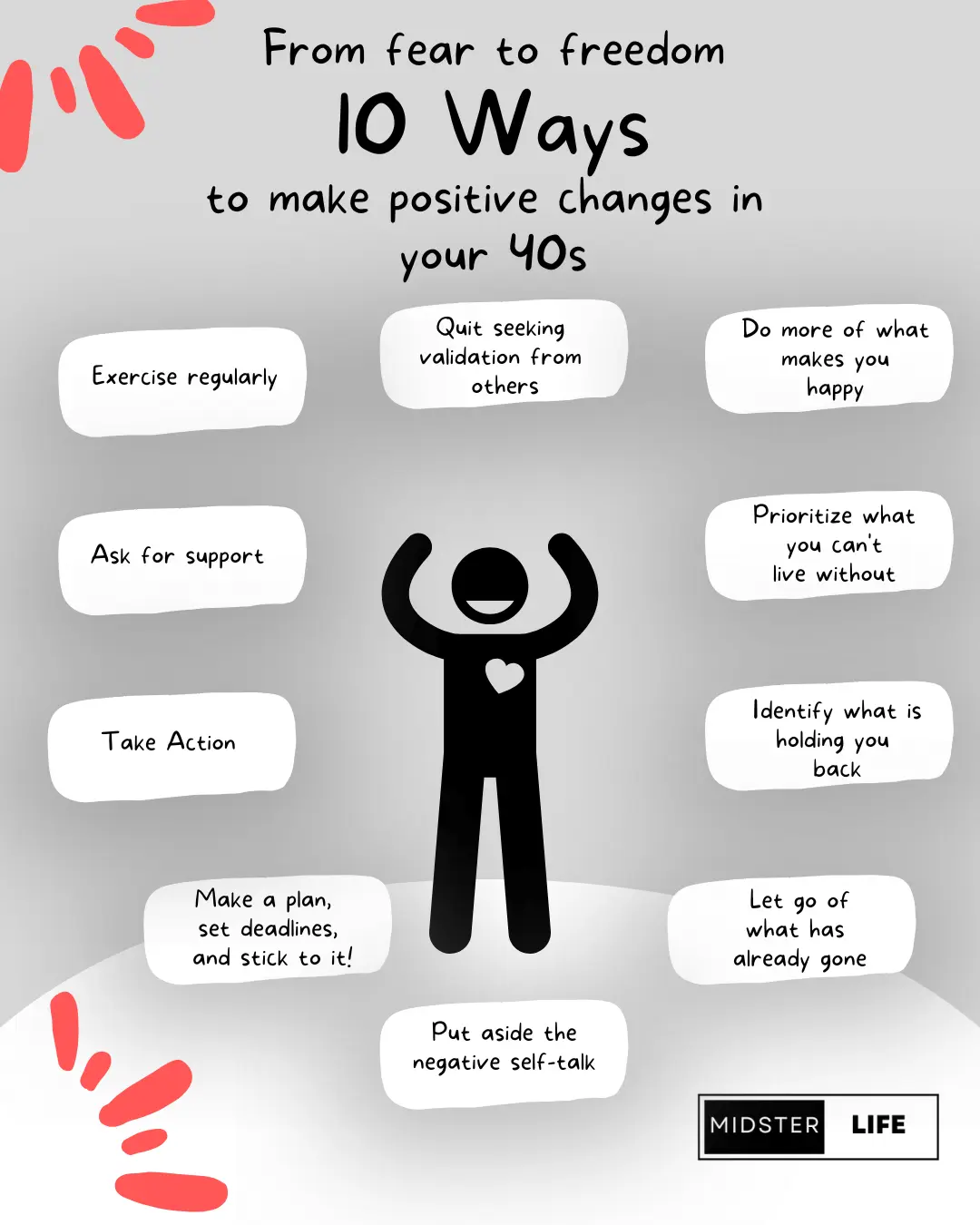From Fear to Freedom: 10 Ways To Make Positive Changes in Your 40s
As we enter our 40s, we may reflect on our lives and consider how to make positive changes to improve our overall well-being.
Whether achieving personal goals, making lifestyle changes, or cultivating healthy relationships, our 40s present a unique opportunity for self-discovery and growth.
This article will explore 10 practical and achievable ways to make positive changes in your 40s. By adopting these tips, you can enhance your physical and mental health, strengthen your relationships, and achieve greater purpose and fulfillment in your life.
So let’s jump in and discover how you can make the most of this transformative decade.
1). Quit seeking validation from others
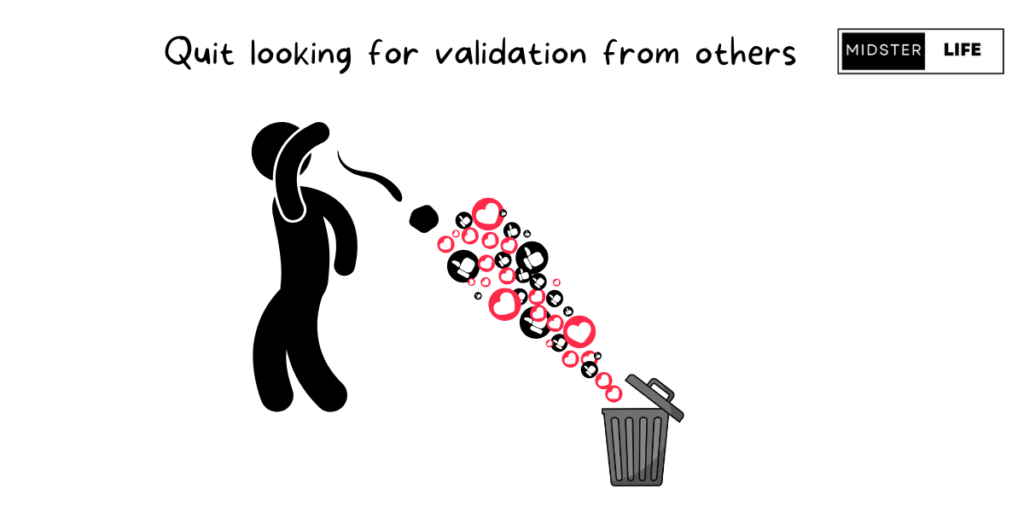
While seeking validation from others is a natural human behavior, it can become problematic when it becomes a constant need that dominates your thoughts and actions.
Relying on external validation for your self-worth and happiness can lead to feelings of anxiety, stress, and self-doubt as you become overly dependent on others’ opinions of you.
Furthermore, seeking validation from others can lead you to compromise your values and beliefs to please others, which can be detrimental to your personal growth and development.
By cultivating a strong sense of self-worth and self-validation, you can break free from the cycle of seeking external validation and instead prioritize your needs, desires, and goals. A strong sense of self-worth can lead to greater confidence, self-esteem, and a more authentic and fulfilling life.
2). Do more of what makes you happy
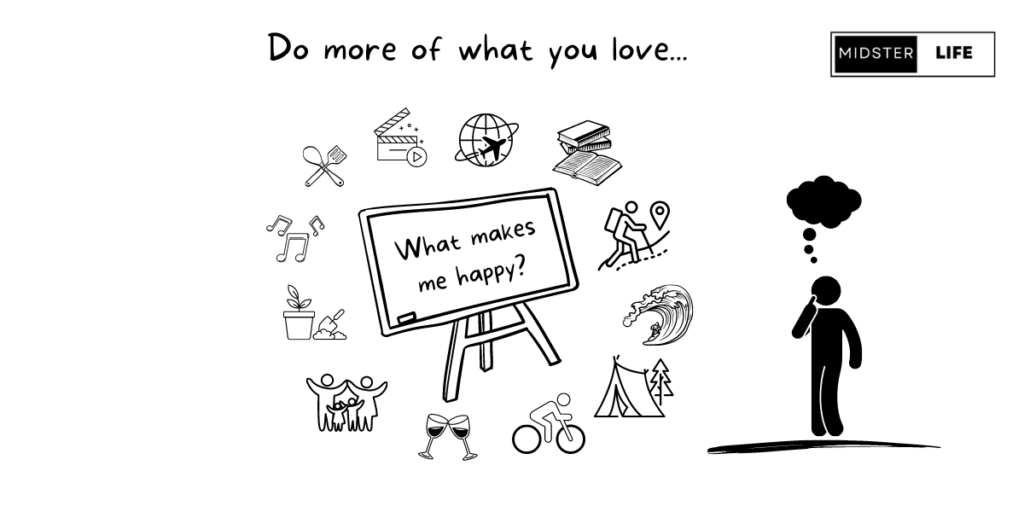
Are you spending time on activities you think you should be doing rather than what you actually want to do?
It’s easy to fall into the trap of fulfilling your obligations to those around you and taking responsibility without reflecting on whether you are getting the most out of life.
Maybe you’ve completely lost touch with what makes you happy. If that’s the case, try these steps to rediscover the joy in your life:
- Work out what your values are. What is important in your life? What do you want to prioritize? Family, relationships, career, personal growth, adventure, spirituality. If you pin down what matters to you, you can ensure what you do aligns with those values.
- Reflect on past experiences. Are there times in the past when you felt truly happy and fulfilled? What were you doing? Who were you with? What made it special for you? This activity can help you identify the themes which can make you happy in the present.
- Try new things. Being open to new experiences and activities can help you discover new passions and interests. List all the activities you ever wanted to try and tick them off like a bucket list.
- Be mindful of your emotions. Pay attention to when you feel good, and note the activities that make you happy and fulfilled. Become aware of those that drain you. This way, you can make small changes to prioritize the good experiences over the bad.
3). Prioritize activities you can’t live without
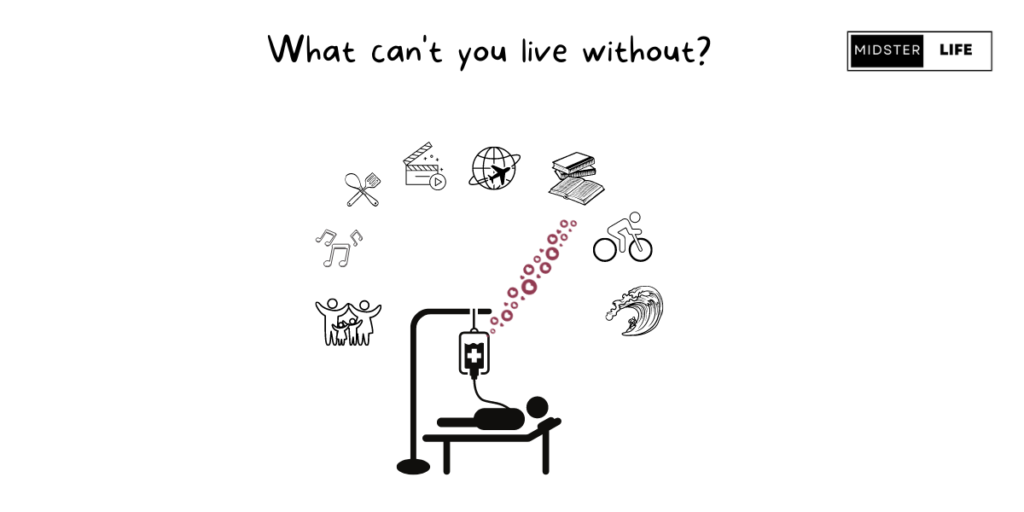
So now you know which activities you love and what makes you happy. Which ones are non-negotiable? Which can’t you live without?
Pick the top 3 areas/activities in your life and spend more time focussing on these.
You can’t do everything, so spending time reflecting on what makes you happy and drilling down to the most critical three areas will give you a better chance of succeeding in changing and improving these areas of your life.
4). Identify what is holding you back

Once you’ve got a clearer idea of the new direction you want to move in, you need to understand what is currently holding you back from making that change.
Of course, it depends on the type of goals you have. If you aim to get physically active and lose weight, identify what is holding you back from achieving this.
Have you picked up several bad habits over the years? Maybe you snack on chocolate in the afternoon? Or have too many beers on the weekend? Be honest with yourself about what needs to change.
It could be that your career is stalling, and you want more out of this area of your life.
Think about why you have yet to make the progress you’ve wanted. Again, be honest. Are you open to all the opportunities that present themselves to you? Or are you acting from a place of fear and missing out?
Take steps to open yourself up. Volunteer to get involved in something you wouldn’t normally do. Taking action will help you grow.
It will feel uncomfortable as you move away from those emotions and habits holding you back but go with it. Regret, fear, worries, and bad habits will only keep you in one place, right where you are.
Be brave and say, “I’m no longer willing to put up with this.”
5). Let go of what has already gone

Letting go of the past is often easier said than done.
Overcoming deeply ingrained emotions from past experiences, relationships, failures, and missed chances can take significant time, effort, and support.
By holding to the past, you risk allowing negative emotions such as regret, guilt, and resentment to shape your future, which can adversely affect your mental health.
You risk straining relationships with people that are important to you. By letting go of the past, you move toward healthier and more positive relationships with others.
Focus on the present and operate without fear or guilt. You can then start to move forward and grow as an individual.
Dwelling on the past will keep you rooted there. Focus on things you can control:
Concentrate on today only.
What can you do with your body, and what can you do with your mind right now?
What are you doing to make this day the best you can?
6). Put aside the negative self-talk
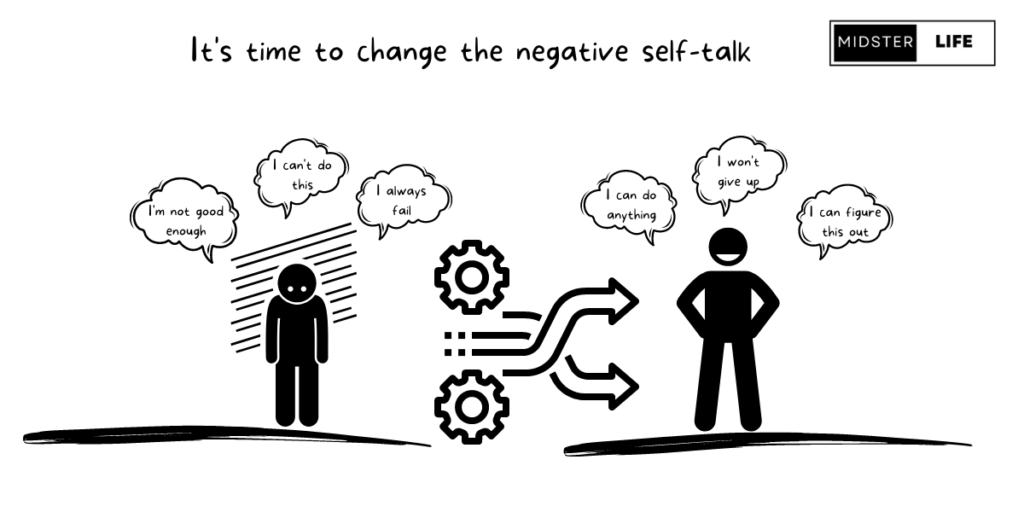
We all have that inner chatter whirling around in our minds, generally at the most inopportune moments (at 3 am, right?).
What is it that is holding you back?
Bad habits, a need for perfectionism, fear, regret, or self-doubt are all things that may be keeping you stuck. And, if they are, you must identify and kick them to the curb.
Be patient, as it will take time to transform negative thoughts into positive ones.
Try these steps to challenge your inner self-talk and self-limiting beliefs:
- Recognize when your negative self-talk is speaking.
- Challenge your negative self-talk. Ask yourself, is this thought fact or fiction? “Is this really true?” “What evidence do I have to support it?”.
- Reframe your thoughts. Can the thought be turned around into a positive? “I can’t do this” can be turned into “I can’t do this yet, but I can learn.”
- Avoid negative thought loops. It can be easy to beat yourself up for having negative thoughts, but by accepting the thought and letting it go, you can move on more quickly.
- Be positive. Spend time with people who make you feel positive and energize you, and counteract negative self-talk.
7). Make a plan, set deadlines, and stick to it!
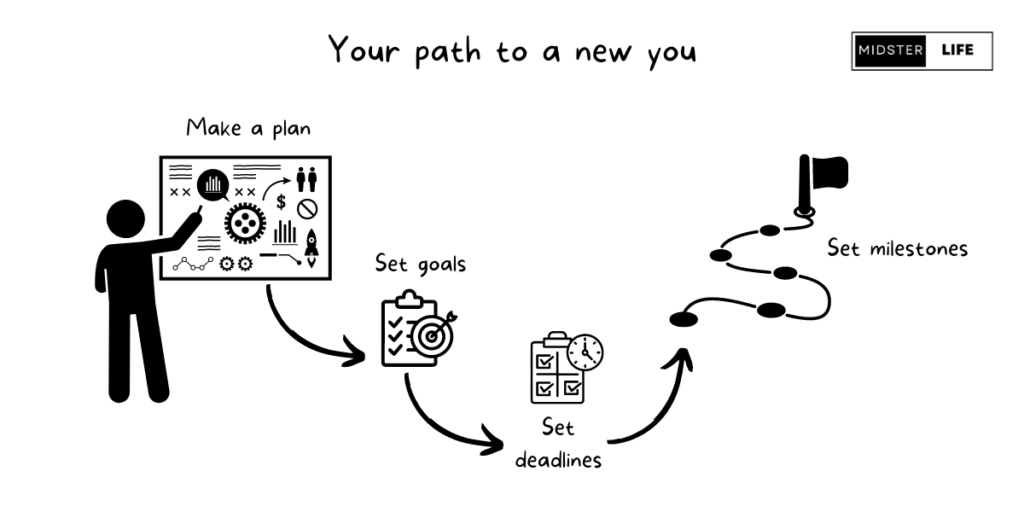
Without a plan, how do you know where you a going? Transforming your life after 40 comes with lots of challenges. You have more responsibilities than at earlier points in your life. Winging it is a risky option.
Your plan acts as your map, and the deadlines and milestones you set act as touchpoints to hold yourself accountable and measure your progress.
When trying to make positive changes after 40, planning is essential because it provides the following:
- Clarity of vision. If you are clear about what you want to achieve and your goals, you are less likely to become overwhelmed and stuck on how to progress. Clear objectives, precise steps, and points to measure against will set you up for success.
- Accountability. With a clear set of deadlines and milestones, you can create a sense of accountability for yourself. You are more likely to take action and follow through with deadlines in place.
- Motivation. Deadlines and milestones will also motivate you to make progress toward your goals. Specific, measurable targets can provide a sense of accomplishment and momentum, which help push you closer to your goals.
But what if you don’t know where to start?
8). Take Action
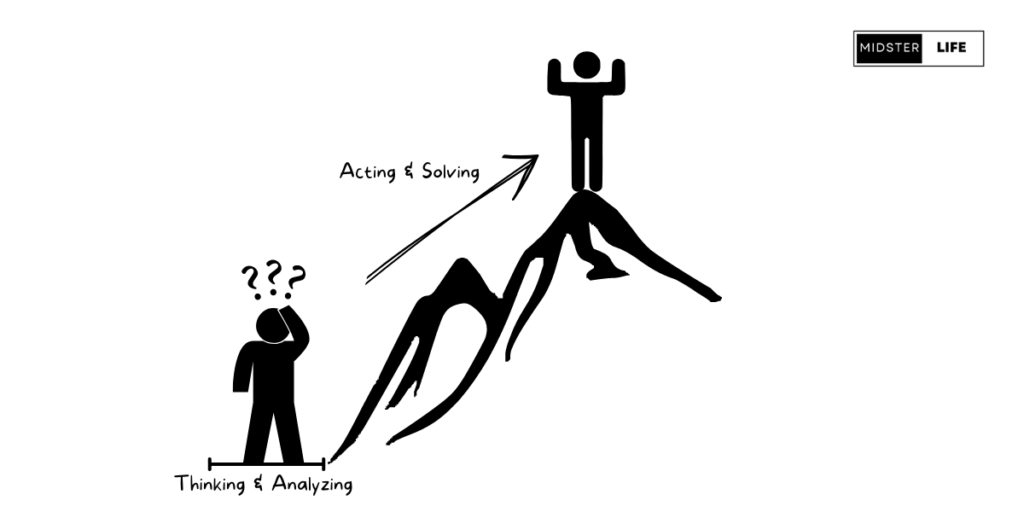
At the start of any journey of change and transformation, the end goal may be unclear.
By taking consistent action, you will be able to overcome this. With time the end goal will become more apparent, and you will be able to put in place a plan with deadlines and milestones to get you there.
Commit yourself to small daily actions moving you closer to your goals.
Daily journalling, mindfulness, or meditation can help improve self-awareness and better understand your thoughts, emotions, and behaviors.
These actions may also increase your resilience to stress and anxiety, which may help you cope better with any setbacks that come along the way.
Commit to learning new skills. Try learning a new language, or improve your public speaking skills. You will pick up a new skill that may help you in the future and build confidence and self-esteem. The confidence you gain can also positively affect your relationships, career, and overall well-being.
Push yourself to do what you know you need to, even though you don’t want to. Overcome analysis paralysis by accepting the call to adventure.
Start with small commitments – a 10-minute walk, 5 minutes of writing, or 15 minutes of the course you’ve signed up for. The important thing is to build a consistent habit.
9). Ask for support

Don’t do it all alone.
Making positive changes to your life after 40 without support will be challenging. There will be many barriers to overcome, including the internal narrative you tell yourself or the regrets and limiting beliefs from the past holding you back.
Finding support to overcome these is vital.
The benefits of having a solid support network when trying to change your life are the following:
- Encouragement and motivation. Who wants to celebrate successes alone? No-one! Having a support network to share your progress and accomplishments will help motivate you to stay on course. And when you feel stuck, or progress has stalled, those same cheerleaders will encourage you and help you get moving again.
- Accountability. Suppose you have a network of people invested in your personal growth. In that case, they can keep you accountable for your commitments. Doing it alone may result in you giving up when things get too hard. A good support network will be there to keep you on track.
- Feedback and guidance. When starting on something new, you don’t always know whether you are on the right path, is what you are doing any good? A strong support network can give you constructive feedback and guidance to help you grow and achieve your goals.
- Emotional support. Your support network can also be the listening ear you need to support you when there are setbacks or times are challenging. This support should give you an outlet and a way of managing stress and anxiety.
10). Exercise regularly
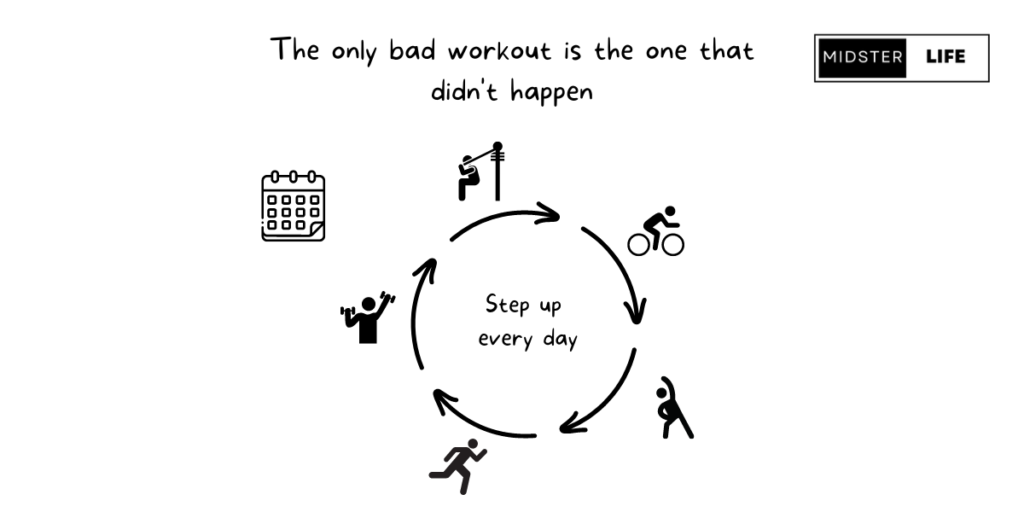
Exercise is essential for transforming your life and improving your overall health and well-being.
Don’t panic, though. It doesn’t mean you have to knock out a 60-minute gym session every day, but getting active in some form is essential.
Exercise improves your physical health, boosts your immune system, strengthens your muscles and bones, and reduces the risk of chronic diseases like heart disease and diabetes.
But it will also improve your mental health, reducing anxiety, improving mood, and reducing stress levels. You may also see increased confidence and self-esteem due to introducing a regular habit.
Beyond this, exercise can also boost productivity as, over time, your energy levels increase and sleep quality improves. With increased energy levels, you can concentrate better and deal with the challenges of transforming your life in your 40s.
By taking the positive steps above to change your life, you can put yourself on a sound footing to change your life, continue to grow, and make the most out of your 40s and beyond.

